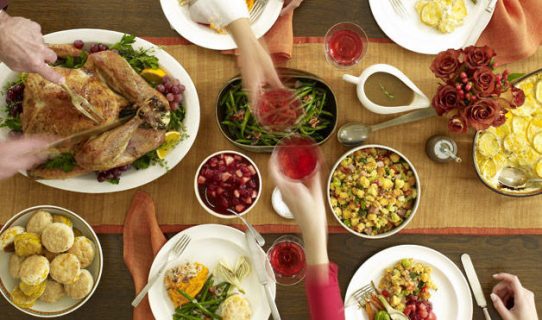
“I’m definitely going on a diet after today!” “Are you going to finish your mashed potatoes?” “I really shouldn’t eat this…”
Even more so than other holidays, Thanksgiving often revolves around food: Eating food, talking about food, making food, food competitions, who’s going to clean after everyone is done eating the food, who’s taking home leftover food. This can be stressful for anyone, but it’s particularly so for young people with eating disorders. As a specialist in adolescent medicine, I work with young people every day who struggle with these disorders. For them, getting through Thanksgiving can be hard. But if you have an eating disorder (or will be spending Thanksgiving with someone who does), there are plenty of ways to make getting through the holiday easier—and even enjoyable.
If you have an eating disorder, remember that Thanksgiving is a time of celebration!
Don’t put pressure on yourself to eat a certain way. Instead, concentrate on enjoying your family and loved ones. This day is about enjoying yourself, and you should make that a priority. Concentrate on the people you love. If there’s a time that you know will be particularly difficult (such as right after the meal) put together a plan for ways to get through it, such as going for a walk with your favorite cousin or busying yourself with the dishes.
Plan your meals before Thanksgiving. People’s eating schedules often get thrown off by the promise of a huge meal, but those with eating disorders (and everyone, really) should still keep to a regular eating schedule. Make sure to eat breakfast and have an afternoon snack. Think in advance about what foods you’d like to eat at Thanksgiving, and get excited for them! Let yourself eat your “cheat” foods.
If you’re spending Thanksgiving with someone with an eating disorder, there are several things you can do to help make the day less stressful for them.
Perhaps most importantly, NEVER draw attention to the eating disorder. Don’t comment on what they’re eating or not eating. Don’t make comments about their weight—even if you think they’re compliments, they may not sound that way. Saying, “You look so healthy!” may sound like “You look fat.” My patients often become anxious on Thanksgiving because they feel like they’re being scrutinized. Commenting on their appearance or what they’re eating only makes this worse.
Discourage other family members from talking about weight, diets, or guilty feelings about food. Seemingly casual comments like, “I have to go on a diet after this meal!” or “I’m so bad—I really shouldn’t eat this extra slice of pie,” can be triggering. Calling food “bad” usually has more to do with shaming self-indulgence than highlighting a food that’s unhealthy. People with eating disorders often have to work very hard against food-related shame, and comments about “bad” foods only reinforce those feelings.
This does NOT mean that you should tell family members about the eating disorder.
Instead, frame your request as general advice: “Please try to avoid talking about diets and weight this year—we’re trying to have a guilt-free Thanksgiving .” Or: “We don’t want to encourage the younger family members to feel self-conscious about their weight or what they eat, so please don’t bring up these topics.”
Families can also help by having their big Thanksgiving meal earlier in the day. This allows time to eat a second meal later in the day, which lessens the chance that people with an eating disorder will feel guilty for overstuffing themselves. Eating two moderate-sized meals instead of one big meal can help alleviate feelings of guilt, and may make it easier for those with binge eating disorders to avoid bingeing.
Try to take the attention away from the meal itself. Establish a family tradition that doesn’t involve food. My family plays a huge game of Monopoly after we eat. You could also make it a tradition to watch the Macy’s Thanksgiving Day Parade, National Dog Show, or football game. It doesn’t matter what it is, so long as it’s a fun activity for everyone and doesn’t revolve around food.
If you have an eating disorder, talk to your doctor or therapist about ways to handle the stress of Thanksgiving and the holidays.
Everyone is different, and they can help you with the plans and coping strategies that work best for you. If you’re between the ages of 10 and 22 and live in NYC, call the Mount Sinai Adolescent Health Center for a completely free, confidential and judgment free appointment with a medical provider.
Lonna Gordon, MD, PharmD is a pediatrician at Mount Sinai Adolescent Health Center who is fellowship trained in adolescent medicine. In addition to general adolescent care, Dr. Gordon sees obese adolescents who are interested in comprehensive medical and reproductive health care through a structured, multidisciplinary approach to weight loss.
The Mount Sinai Adolescent Health Center is located in New York City. It provides comprehensive, confidential, judgment free health care at no charge to over 10,000 young people every year. This column is not intended to provide medical advice, professional diagnosis, opinion, treatment or services to you or to any other individual, only general information for education purposes only.


